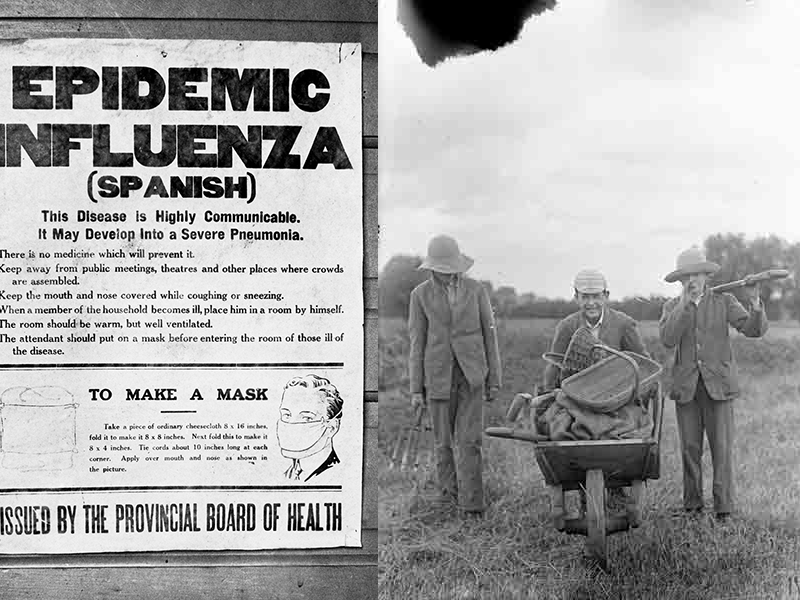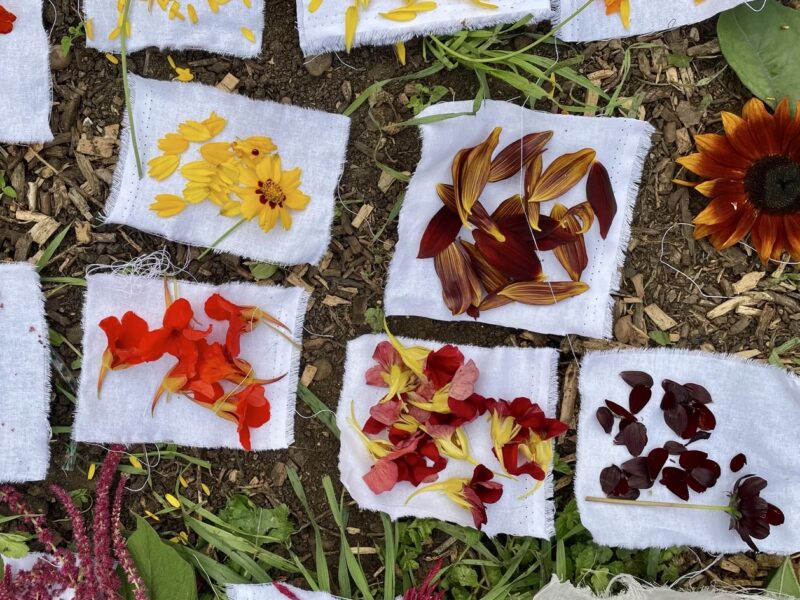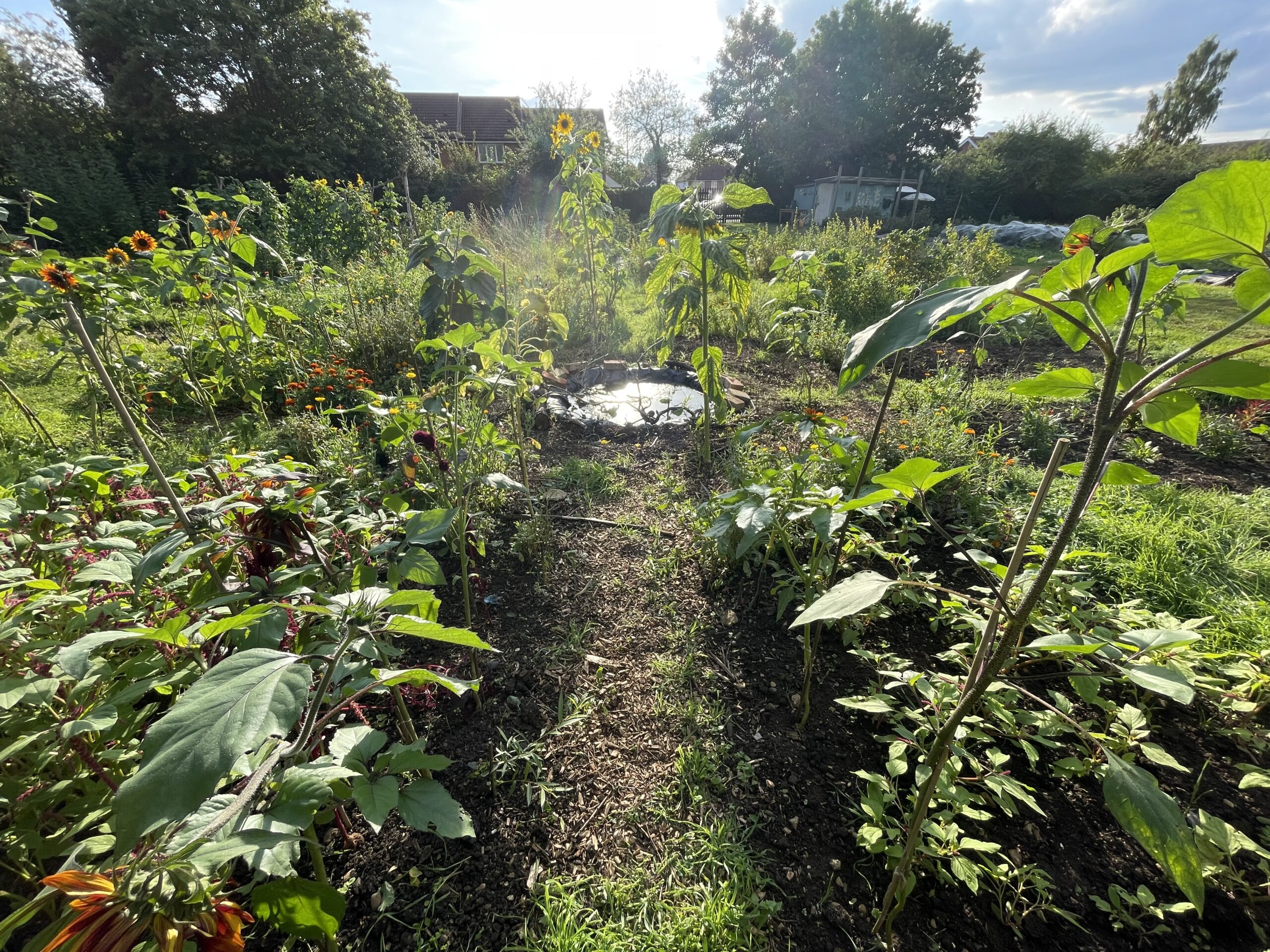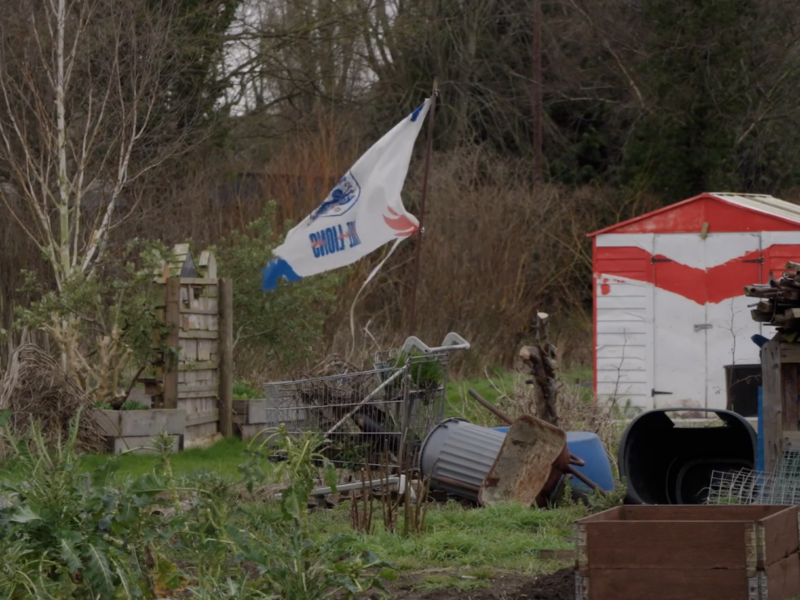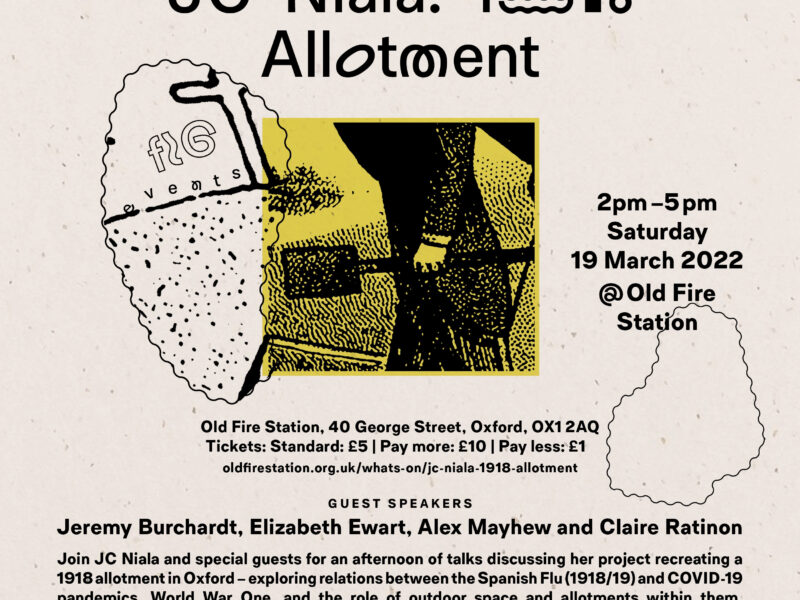Journal — May 2022
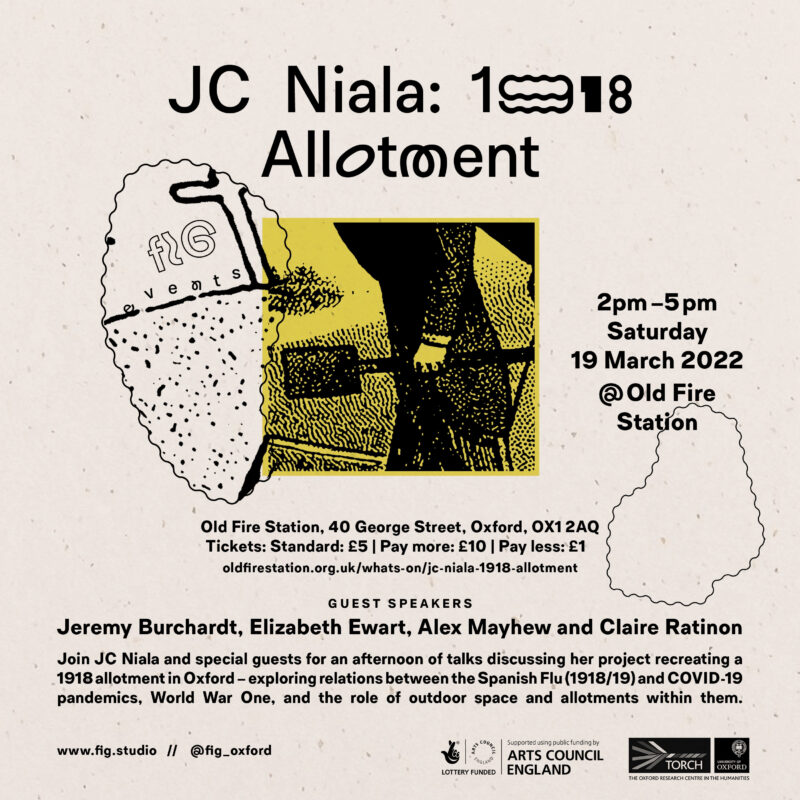
On 19.03.22 at the Old Fire Station in Oxford, JC Niala launched her book and exhibition, and hosted four speakers whose work informed the 1918 Allotment project. A wonderful range of talks included: Jeremy Burchardt on the history of allotments in the UK; Elizabeth Ewart on indigenous gardening practices in Brazil and Ethiopia; Alex Mayhew on allotments in the First World War; and Claire Ratinon sharing her journey into horticulture. JC also described the genesis of the project and read from Portal. Collectively, the event brought her project to life and there were many fascinating threads connecting the different talks. We had a full house in the theatre! and it was great to see such a large and engaged audience for the event. Video documentation of the talks and discussion are presented below. The event was supported by the Humanities Cultural Programme at The Oxford Research Centre in the Humanities.
Schedule & order of videos:
JC Niala: Introduction
Jeremy Burchardt: Gaining the Plot
Elizabeth Ewart: Beauty and value: growing things in central Brazil and southwest Ethiopia
Alex Mayhew: Allotments, Vegetable Shows, and Coping during the First World War
Claire Ratinon: Growing Food in a City is a Radical Act
Q&A / Panel & Audience Discussion
Abstracts and bios can be read at the bottom of the page.
JC Niala: Introduction
Jeremy Burchardt: Gaining the Plot
Elizabeth Ewart: Beauty and value: growing things in central Brazil and southwest Ethiopia
Alex Mayhew: Allotments, Vegetable Shows, and Coping during the First World War
Claire Ratinon: Growing Food in a City is a Radical Act
Panel & Audience Discussion
ABSTRACTS AND BIOS
JC Niala (School of Anthropology & Museum Ethnography, University of Oxford)
1918 Allotment: How recreating the past can support growing into a better future
Growing and war are both ways in which societies organise themselves. Although they might seem contradictory, they also have an intimate relationship. They are also both activities usually carried out in outdoor spaces. I’ll be opening the discussion event by sharing what I learned by recreating an allotment in the style of the year 1918. I will share how the practice of growing allows for unforeseen connections, as well as some of the stories that arose from my research.
Bio: I am a doctoral researcher at the School of Anthropology and Museum Ethnography, University of Oxford. The title of my thesis is ‘Banal Utopia: urban gardening as a practice for materialising utopic city spaces’. A key part of my methodology is public engagement with research. I combine my academic research into how people make their places in the world, with my creative practice as a poet, playwright, and nature writer. The creative works being released in 2022 that explore this theme are my artist’s journal of poems Portal: 1918 Allotment, a nature writing book A Loveliness of Ladybirds and a play 1918.
Jeremy Burchardt (Department of History, University of Reading)
Gaining the Plot: Allotments, Well-Being and Community since 1800
Allotments have been a key resource for physical, mental and community well-being since they were introduced in the late eighteenth century. They can be particularly valuable in times of crisis, as many people have found during the covid-19 pandemic. In this talk I want to say something about the different ways, some familiar, some surprisingly different, in which allotments promoted well-being in the nineteenth century, the period on which my research is focused. I’ll also talk briefly about the well-being role allotments played during some of the key crises of the twentieth century, including WW1, the Spanish Flu, the interwar depression and WW2.
Bio: I am fascinated by the different ways we experience landscape – how it interfuses itself with aspects of our being, sometimes quite profoundly, and the changes and continuities in this across time and space. Researching such an elusive subject is challenging, especially in a historical context, but that makes it all the more intriguing and rewarding, as I hope to show in my forthcoming book, Lifescapes (CUP, forthcoming). This follows on from my previous research on other landscape-related themes, including the history of allotments (e.g. The Allotment Movement in England, 2002; Breaking New Ground, 2010).
Elizabeth Ewart (Institute of Social & Cultural Anthropology, University of Oxford)
Beauty and value: growing things in central Brazil and southwest Ethiopia
In my short talk, I would like to introduce you to Panará Indigenous people in central Brazil and talk about the values and aesthetics that guide their gardening practices. Food production is a key pre-requisite in caring for others, and this in turn is the basis for producing kinship relations. Beyond producing food for daily consumption, planting and tending ti their gardens is about more than mere food production for Panará people. In the highlands of southern Ethiopia, a country often associated with assumptions of poverty and famine, aesthetic and moral values also inform farmers’ practices. Caring for the land, tending to animals and planting particular crops around the homestead are all informed by more than the simple need to produce food.
Bio: I am associate professor of social anthropology at the University of Oxford. Since 1995 I have worked with Panará Indigenous people in central Brazil. There I have done research on village spaces, kinship, and identity. I have also worked on ideas of beauty and value in relation to body ornaments, garden space, and material culture. More recently, I have carried my interest in gardens and cultivation to a new fieldsite in the highlands of Ethiopia. Together with Dr Wolde Tadesse I am researching small-scale farming practices, particularly focusing on interrelations between staple crops, animals, land, and people. In this work we try to understand the values and aesthetic dimensions that guide farmers as they go about growing their crops and tending their animals.
Alex Mayhew (Historian based at the London School of Economics)
Allotments, Vegetable Shows, and Coping during the First World War
Enduring military service in the First World War demanded adaptation. It lasted for over four years and for much of that time there was little sense of when it would ever end. Individuals suffered a series of overlapping crises as time began to lose all meaning. Yet, in ways that that might have become familiar during the era of COVID-19, people found ways to cope. Many soldiers turned to gardening as they sought to create a sense of their own ‘new normal.’ They sowed flower beds in trenches, tended to the plants in cemeteries, and (away from the frontlines) built an extensive network of allotments. To celebrate (and encourage) this work, the British Army held a series of vegetable shows on the Western Front, which, as Dr. Alex Mayhew will explain, can tell us a lot about 1914-1918 and the ways in which people one hundred years ago made sense of the conflict.
Bio: Dr. Alex Mayhew is a social and cultural historian of modern warfare based at the London School of Economics and Political Science. His research focusses on the morale and identity of British soldiers during the First World War and his first book, Making Sense of the Great War: Crisis, Englishness, and Morale on the Western Front, will be published by Cambridge University Press in 2023. Alex’s work has also appeared in War in History, The Historical Journal, and The English Historical Review (forthcoming).
Claire Ratinon (Organic food grower and writer based in East Sussex)
Growing Food in a City is a Radical Act
The practice of growing food might not appear to be a radical act but – in this time of land inequality, widespread nature disconnection and under the shadow of the industrialised systems that feed us – it is. When I changed paths to pursue the work of food growing, I did so living in the city. I was captivated by the practice of growing edible plants in built-up spaces where land is coveted for its ability to accumulate wealth instead of its fertile soil. And even though I live in the countryside now, I’m still deeply passionate about growing food in unlikely spaces and encouraging others to give it a try. In this talk, I will explore more of my personal journey from documentary producer to food grower, and how transformative returning to this humble but powerful practice can be.
Claire Ratinon is an organic food grower and writer based in East Sussex. Claire has grown edible plants in a variety of roles from growing organic vegetables for the Ottolenghi restaurant, Rovi to delivering workshops throughout London. Claire has been invited to share her growing journey in talks for organisations including The Garden Museum, Charleston House and Royal Botanical Garden, Edinburgh, as well as presenting features for Radio 4’s Gardeners’ Question Time. Her writing has been featured in The New Statesman, Bloom Magazine and Waitrose Food Magazine. She co-wrote the pamphlet, ‘Horticultural Appropriation’ for Rough Trade with artist, Sam Ayre and her first book, ‘How To Grow Your Dinner Without Leaving The House’ is out now. Her second book, ‘Unearthed: On Race and Roots, and How the Soil Taught Me I Belong,’ will be published in June 2022.
